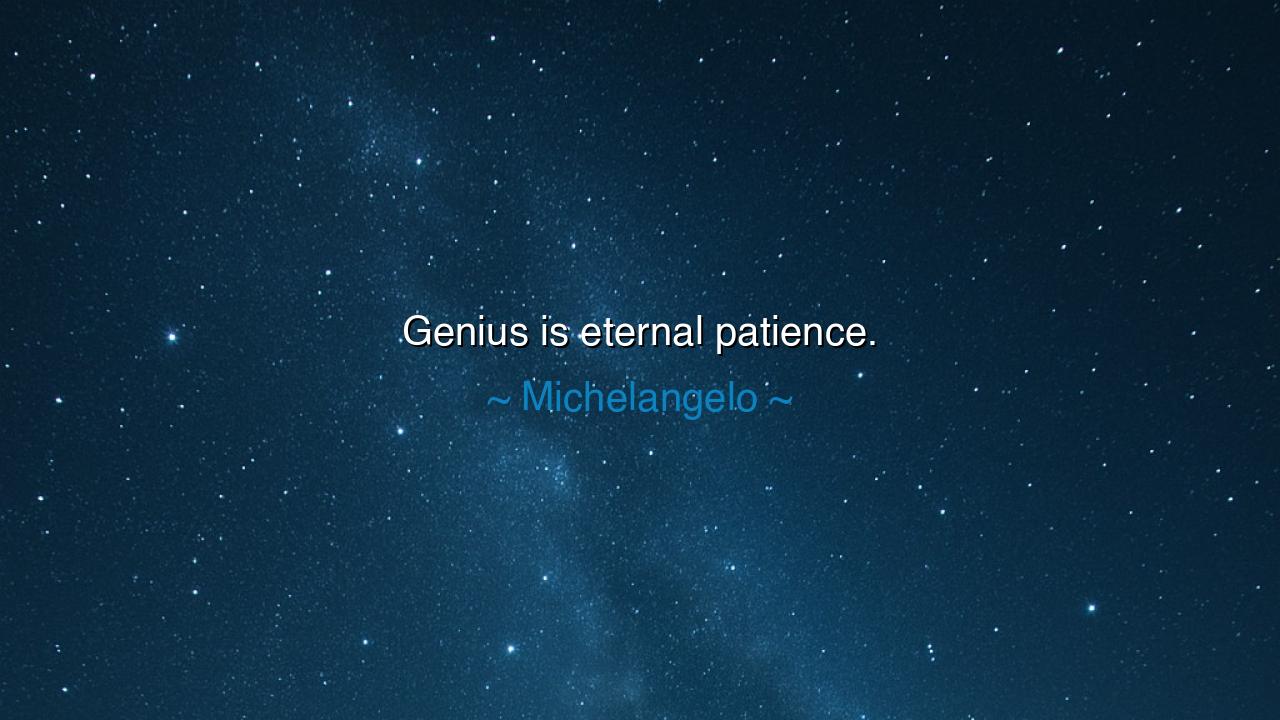
Genius is eternal patience.






Hear the immortal words of Michelangelo Buonarroti, the sculptor of David, the painter of the Sistine Chapel, the architect of St. Peter’s dome, who once proclaimed: “Genius is eternal patience.” These words are no idle flattery of human skill; they are a revelation born of a lifetime of struggle, chiseling, and endurance. For Michelangelo knew that greatness is not the child of haste, nor the sudden spark of a fleeting moment, but the fruit of endless patience, refined by toil and tempered by time.
The meaning of this truth is profound. Many imagine genius to be a lightning flash—sudden, dazzling, and short-lived. Yet Michelangelo teaches otherwise: true genius is not in the first inspiration, but in the unrelenting labor that follows. The Sistine ceiling was not painted in a single night of brilliance; it was born of years of stretching, of aching muscles, of colors laid stroke by stroke with infinite care. The David was not revealed in a single strike of the chisel; it emerged from years of steady blows, each guided by patience that saw not the marble block, but the form hidden within.
History itself confirms this wisdom. Consider the discoveries of Isaac Newton. His laws of motion and gravity were not written in the rush of an hour, but in years of observation, calculation, and thought. He once said, “If I have seen farther, it is by standing on the shoulders of giants.” Yet even upon those shoulders, it was patience—the slow and steady turning of problems over in his mind—that transformed his insight into enduring truth. Genius, indeed, is eternal patience.
So too we see it in the life of Thomas Edison, who attempted thousands of trials before perfecting the electric bulb. When asked about his failures, he responded that he had not failed, but had found ten thousand ways that did not work. His genius was not a sudden miracle, but the patience to endure disappointment, to persist when others surrendered. By his patience, he lit the world.
The deeper origin of Michelangelo’s words lies in the very nature of creation. Nothing great is rushed. Mountains rise slowly, rivers carve valleys over centuries, and stars themselves take eons to be born. Why then should man believe that his greatest works can be achieved in haste? The hand of genius moves like the hand of nature: deliberate, enduring, unyielding. This is why Michelangelo equated genius with eternal patience—because only through patience does vision crystallize into reality.
Let the lesson be clear for every soul who seeks greatness. Do not envy the swift who seem to triumph quickly, for their works often fade as swiftly as they rise. Envy instead the steadfast, who through patience build foundations that cannot be shaken. Train yourself to wait, to endure, to labor without despair. For every hour of toil is a stone placed in the temple of your genius.
Therefore, O seeker of wisdom, cultivate patience as your greatest ally. Be patient with your learning, patient with your failures, patient with your dreams. Let your craft mature as the vine matures, slowly ripening under sun and rain until the fruit is sweet. Know that every delay, every obstacle, every season of waiting is not a denial, but a preparation.
Thus I say unto you: genius is eternal patience. If you would carve your David, if you would paint your ceiling, if you would build your cathedral—endure. Let your patience be eternal, and your work shall echo through eternity, as Michelangelo’s does still.






AAdministratorAdministrator
Welcome, honored guests. Please leave a comment, we will respond soon